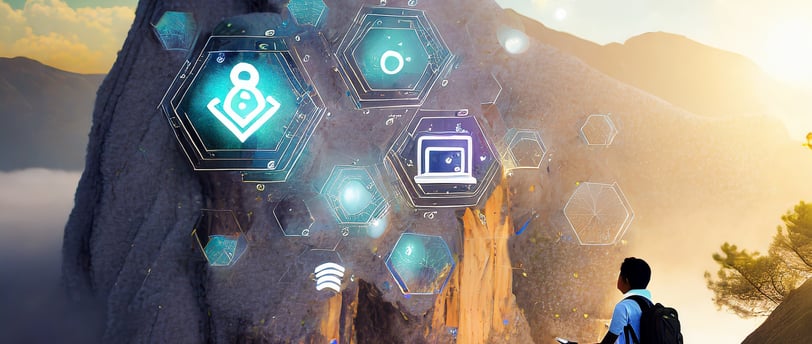Harnessing AI for Educational Transformation: A Vision of Abundance by Musk and Diamandis
Explore how AI is transforming education into an abundant, accessible future, as envisioned by Elon Musk and Peter Diamandis. Delve into the role of AI in personalizing learning and preparing students for a technologically advanced world


In the evolving landscape of education, the integration of Artificial Intelligence (AI), particularly tools like ChatGPT, stands as a beacon of transformative change. This shift aligns seamlessly with the visions of Elon Musk and Peter Diamandis, who advocate for leveraging technology to create a future rich in resources, opportunities, and educational abundance. The synergy of AI in education not only promises to redefine traditional learning paradigms but also to actualize the abundance that Diamandis frequently champions, a vision supported by Musk's insights on technological advancements.
Transforming Educational Paradigms
The traditional educational model, largely unchanged for decades, is ripe for disruption. As Musk and Diamandis discussed, current systems often fail to prepare students for the rapidly evolving world. Here, AI, particularly advanced chatbots like ChatGPT, can play a pivotal role. These tools can personalize learning, adapt to individual student needs, and provide resources and information in an interactive, engaging manner. This personalized approach could address one of Musk's key concerns: the slow adaptation of educational institutions to technological advancements.
Curriculum Development and AI
One of the most significant impacts of AI in education, as highlighted by Paul LeBlanc of SNHU, is in curriculum development. The use of AI can drastically reduce the time and resources required to update and create curricula, ensuring that educational content remains relevant and up-to-date. This rapid adaptation is crucial in a world where, as LeBlanc notes, AI has made almost all curricula outdated overnight. By leveraging AI, educators can continuously evolve teaching materials, keeping pace with the latest developments in science, technology, and society.
Enhancing Learning Experiences
ChatGPT and similar AI tools can enhance the learning experience by providing instant access to information, facilitating language learning, and offering personalized tutoring. This aligns with Diamandis's vision of democratizing education, making high-quality learning experiences accessible to a broader audience. AI can break down geographical and socio-economic barriers, providing students worldwide with access to the same quality of education, resources, and opportunities.
Fostering Critical Thinking and Creativity
Contrary to fears that AI might diminish critical thinking and creativity, these technologies can actually enhance these skills. By handling routine tasks and providing foundational knowledge, AI frees students and educators to focus on higher-order thinking skills. In line with LeBlanc's approach at SNHU, students can use AI to draft essays or solve complex problems, then critically analyze, refine, and improve upon the AI-generated content. This process encourages a deeper understanding and application of knowledge, fostering both critical thinking and creativity.
Preparing for a Future Workforce
As Musk and Diamandis have often emphasized, the future workforce will require a new set of skills, with an increased focus on technology, innovation, and adaptability. AI in education can prepare students for this future, offering training in digital literacy, data analysis, and the ethical use of technology. By integrating AI into the curriculum, educational institutions can ensure that graduates are not only proficient in their chosen fields but also equipped with the skills necessary to thrive in a technologically advanced workforce.
Addressing the Skills Gap
AI-driven education can help address the skills gap in various industries. By providing customized learning paths and up-to-date content, AI ensures that students acquire the specific skills and knowledge demanded by employers. This is particularly relevant in fields like engineering, computer science, and healthcare, where advancements happen rapidly, and the gap between academic training and industry requirements can be significant.
Scaling Educational Resources
AI technologies like ChatGPT can scale educational resources to unprecedented levels. They can provide millions of students simultaneous access to tutoring, answer questions in real-time, and offer personalized feedback, something that would be impossible in traditional classroom settings. This scalability is a cornerstone of Diamandis's vision of abundance, where quality education is not a scarce resource but abundantly available to all.
Lifelong Learning and Accessibility
AI facilitates lifelong learning, allowing individuals to continue their education beyond traditional schooling years. This is particularly beneficial for adult learners who can access AI-powered educational platforms to upskill or reskill as needed. Moreover, AI can make education more accessible to people with disabilities, offering tools for translation, speech-to-text services, and customized learning interfaces.
Conclusion: A Future of Educational Abundance
The integration of AI in higher education, as envisioned by thought leaders like Elon Musk and Peter Diamandis, heralds a new era of educational abundance. This paradigm shift promises to make learning more personalized, accessible, and aligned with the needs of a rapidly evolving world. As we embrace AI tools like ChatGPT in education, we step closer to a future where knowledge is not just a privilege of the few but an abundant resource accessible to all.
Watch full video here http://tinyurl.com/yv3e6cm2
